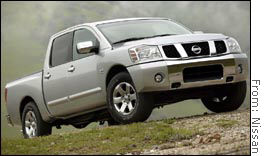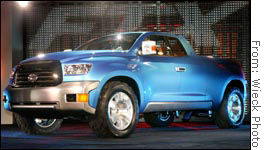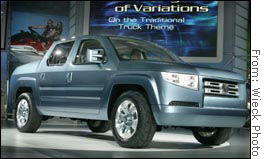DETROIT (CNN/Money) - Japan's automakers are launching a major assault on Detroit's one remaining sector of total dominance -- the full-size pickup truck market.
That already huge segment of the U.S. auto market is of increasing importance to General Motors, Ford Motor Co. and DaimlerChrysler's Dodge brand.
 |
|
| The Nissan Titan is now in in showrooms. |
The three have already seen imports come to dominate in the car market. And for some time now, Japanese automakers such as Toyota, Honda and Nissan have been making strong inroads into light truck territory with popular sport/utility vehicles, minivans and compact pickups.
But when it comes to large V-8-powered full-size pickups, a segment with more than one-eighth of total U.S. vehicle sales, the Big Three still stand virtually alone.
Toyota has the Tundra, which many in the industry consider just a half-step below the true full-size market. Even with Tundra's sales, though, the Big Three have more than 95 percent of the full-size pickup market. The big pickups also bring them their most loyal customers of any vehicle segment, along with some of their best profit margins.
"Every country has its core product," said Chevrolet sales and marketing General Manager Brent Dewar. "In this country the full-size pickup is the big dog."
Now, that dominance has started to show some cracks.
Saturday and Sunday, during NFL playoff games, Nissan kicked off the marketing campaign for its new Titan pickup, which has been arriving at dealerships since Christmas. Officials there concede it is the toughest market they have taken on so far.
"There has been a stigma on import trucks," said Fred Suckow, director of marketing for Nissan. "The full-size segment has always been the one with the greatest loyalty. We know he (the average truck buyer) is a tougher code to crack. But we think he'll respect what we're offering in horsepower, towing capability -- things he's come to look for."
Nissan plans to build about 100,000 Titans at its new plant in Canton, Miss., this year. Suckow said the fact the truck comes from a domestic plant will be part of the automaker's marketing campaign. But it won't be alone among Japanese automakers building new trucks on U.S. soil.
Toyota's pickup plans
At Sunday's opening of the North American International Auto Show, Toyota unveiled a concept version of its first true full-size pickup, tentatively dubbed the FTX. It's set to start production in 2006 at a San Antonio plant now under construction.
 |
|
| Toyota plans its largest pickup in 2006. |
Toyota officials won't call the Tundra a failure in breaking through with traditional full-size truck buyers, but they call it a "learning experience" which has at least provided traditional Toyota customers with a larger pickup option. Now, they say, the new FTX will allow them to compete for the traditional Big Three customer.
"Five years ago, no one thought of the Japanese when they thought of minivans. Then came the Sienna, the Odyssey," said Toyota spokesman Irv Miller, referring to the Toyota and Honda minivans. The Asian-based automakers now own about a third of that market.
"If you offer consumers a vehicle that meet or exceed their expectations, they'll be willing to take a look," he said. "When we come to market with the FTX, we will take a back seat to no one."
So far Japan's No. 2 automaker in U.S. sales, Honda, is not in the full-size pickup fight. But after years of saying it had no plans for a pickup truck of any size, it also showed its first pickup truck offering Sunday.
The concept vehicle is callded the SUT for sport/utility truck. Tthe vehicle, set to start production next year, could open the door for a full-size pickup offering of its own one day, said a Honda executive.
"This is obviously our first step into the real pickup truck category," said Tom Elliott, executive vice president of American Honda Motor Co. Inc. "Let's leave it at that -- a first step."
Big Three look to answer
Officials with the Big Three say are confident they'll have the products and the customer loyalty they need to compete with the new challenges, though they concede it is going to face a serious challenge they haven't had to deal with before.
 |
|
| Honda plans its first pickup next year. |
"We had very loyal customers in the car segment as well before they (Japanese automakers) were here," said Joe Eberhardt, executive vice president of sales and marketing for DaimlerChrysler. "The Japanese are extremely capable competitors in any segment they decide to enter. We have yet to see someone really fail. There's no reason to believe it'll be that different in the truck segment."
But the Big Three aren't conceding the large pickup segment without a fight. Ford's F-150 pickup was named the 2003 North American truck of the year Sunday, and Ford officials said it had record sales in December and the F-series is poised for record sales of more than 900,000 vehicles in 2004.
"The Nissan and Toyota products will carve out a niche in the full-size segment, but the Big Three and F-series will continue to dominate for years to come," predicted George Pipas, head of sales analysis for Ford. "The products and brand names offered by domestics are very strong and getting stronger. The Nissan product is great, but it still has a way to go. So does Toyota."
Chevy's Dewar said GM saw a strong increase in full-size truck sales in 2003, and said it and the other domestic automakers are well-positioned to defend this key segment.
"Additional competitors to a market place is something we're used to," Dewar said. "It's a lot easier to defend a segment than to make conquests. That's true for us and for our competitors."
How loyal are pickup customers?
R.L. Polk figures confirm that the full-size pickup has highest average customer loyalty to the model of any segment -- about 35 percent of buyers want to stay with the model they know and like, compared to 9 to 20 percent loyalty in most other segments. But David Cole, chairman of the Center for Automotive Research, says that still gives the Japanese a lot of room to go after traditional buyers.
"You have one part of the pickup market that is not going to change, but most will shop around," said Cole. "It's good to have loyal customers, but it's not 90 percent or even 70 percent."

|